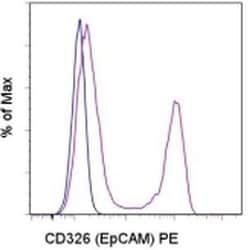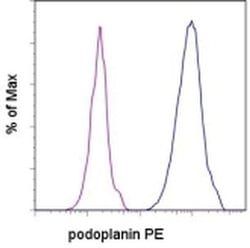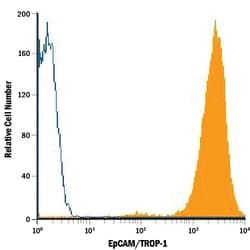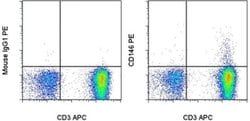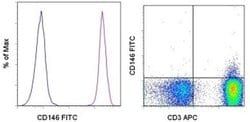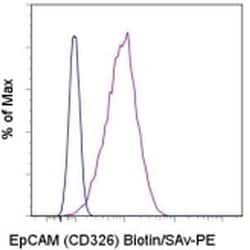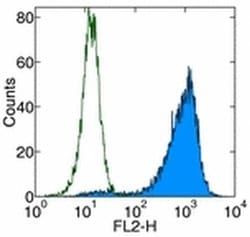CD326 (EpCAM) Monoclonal Antibody (1B7), Biotin, eBioscience™, Invitrogen™
Mouse Monoclonal Antibody
Manufacturer: Fischer Scientific
The price for this product is unavailable. Please request a quote
Antigen
CD326 (EpCAM)
Concentration
0.5 mg/mL
Classification
Monoclonal
Form
Liquid
Regulatory Status
RUO
Formulation
PBS with 0.09% sodium azide; pH 7.2
Gene Alias
adenocarcinoma-associated antigen; CD326; cell surface glycoprotein Trop-1; DIAR5; EGP; EGP-2; EGP314; EGP40; EPCAM; Ep-CAM; EpCAM1; epithelial cell adhesion molecule; Epithelial cell surface antigen; Epithelial glycoprotein; Epithelial glycoprotein 314; ESA; GA733-2; gp40; hEGP314; HNPCC8; human epithelial glycoprotein-2; KS 1/4 antigen; KS1/4; KSA; Ly74; lymphocyte antigen 74; M1S2; M4S1; major gastrointestinal tumor-associated protein GA733-2; mEGP314; membrane component, chromosome 4, surface marker (35kD glycoprotein); MIC18; MK-1; panepithelial glycoprotein 314; protein 289A; Protein D5.7A; Tacsd1; Tacstd1; TROP1; Trop-1 protein; Tumor-associated calcium signal transducer 1
Gene Symbols
EPCAM
Primary or Secondary
Primary
Content And Storage
4° C, store in dark, DO NOT FREEZE!
Gene
EPCAM
Clone
1B7
Applications
Flow Cytometry, Immunohistochemistry (Frozen)
Conjugate
Biotin
Host Species
Mouse
Target Species
Human
Gene Accession No.
P16422
Gene ID (Entrez)
4072
Isotype
IgG1 κ
Purification Method
Affinity chromatography
Product Type
Antibody
Description
- Description: EpCAM (Epithelial cell adhesion molecule, CD326, KSA, TROP1) is a 40 kD cell-surface adhesion molecule participating in homophilic, calcium-independent cell-cell interactions
- EpCAM is a type-I transmembrane protein, and is expressed primarily on the basolateral surface of most epithelia
- Although normal epithelia express low levels of EpCAM, increased expression has been correlated with increased proliferation and progression to a mesenchymal phenotype
- EpCAM has also been used as a diagnostic marker on circulating metastatic carcinoma cells, while cancer cells of non-epithelial origin do not express EpCAM
- Applications Reported: This 1B7 antibody has been reported for use in flow cytometric analysis, and immunohistochemical staining of frozen tissue sections
- Applications Tested: This 1B7 antibody has been tested by flow cytometric analysis of the A549 cell line
- This can be used at less than or equal to 0.25 μg per test
- A test is defined as the amount (μg) of antibody that will stain a cell sample in a final volume of 100 μL
- Cell number should be determined empirically but can range from 10^5 to 10^8 cells/test
- This 1B7 antibody has been tested by immunohistochemistry of frozen tissue and can be used at less than or equal to 10 μg/mL
- It is recommended that the antibody be carefully titrated for optimal performance in the assay of interest
- Filtration: 0.2 μm post-manufacturing filtered
- Ep-CAM (epithelial adhesion molecule, epithelial specific antigen, ESA) is a transmembrane glycoprotein expressed in the epithelium with a molecular weight of approximately 40 kDa, which functions as an epithelial cell adhesion molecule
- Ep-CAM functions as a homotypic calcium-independent cell adhesion molecule, and has a direct impact on cell cycle, proliferation and metabolism of epithelial cells and fibroblasts due to its ability to rapidly induce the proto-oncogene c-myc and the cell cycle regulating genes cyclin A and E
- Ep-CAM mediates Ca2+-independent homotypic interactions
- Formation of Ep-CAM-mediated adhesions have a negative regulatory effect on adhesions mediated by classic cadherins, which may have strong effects on the differentiation and growth of epithelial cells
- Ep-CAM overexpression was suggested to be associated with enhanced epithelial proliferation
- Ep-CAM is highly expressed in human carcinomas, and is a marker for tumors of epithelial lineage
- Ep-CAM is expressed on baso-lateral cell surface in most simple epithelia and many carcinoma types
- Also, Ep-CAM reportedly distinguishes adenocarcinomas from pleural mesotheliomas.


